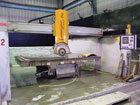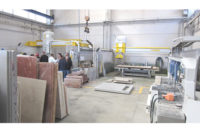
Pokarna Limited of Secunderabad, India, operates two granite factories in the state of Andhra Pradesh, and 40 to 50% of the blocks processed come from the company’s own quarries.
Backed by state-of-the-art stoneworking technology and shrewd marketing concepts that have garnered international honors, Pokarna Limited of Secunderabad, India, has steadily grown into one of the leading suppliers of granite worldwide. And to keep its position of prominence, it has continually upgraded its technology and marketing scope.

Pokarna operates between 10 and 12 quarries, mostly in the state of Andhra Pradesh, where its factory and offices are located.

The main factory in Secunderabad has eight gangsaws, while the second factory has four - most of which were manufactured by Breton S.p.A. of Italy.

Inside the factory, a total of three slab-polishing lines are in place, and all of them are from Breton.
State-of-the-art stoneworking
Pokarna operates two factories in Andhra Pradesh for stone processing. The main factory in Secunderabad has eight gangsaws, while the second factory has four - most of which are from by Breton S.p.A. of Italy. Perhaps indicative of an improving market situation, all of the gangsaws were running at the time of Stone World’s visit to the plant.
Pokarna invested in its newest polishing line, a Levibreton KG 3000 Ultrix, at the beginning of 2009.

Pokarna offers slab materials with a variety of textures, and it has an automated flaming line from Pellegrini for producing thermal-finished material.

The main factory includes a complete resin-application line from Breton, including two large-scale driers.

At the end of the slab-processing line, materials pass through a rigorous quality-control inspection. This is enhanced by Breton’s “Image Master,” which consists of a hardware/software system for taking digital photographs of each slab. The system records detailed inventory of all materials that pass through the line, and it also includes a bar code system for optimum inventory management.

Although an automated resin applicator is in place, much of the resin is applied by hand. This allows the workers to evaluate each slab individually and apply additional resin at the sections that require more attention.

For tile production, Pokarna processes blocks on a Pedrini blockcutter, which cuts the blocks into strips.

A fully automated Pedrini tile line is in place at Pokarna’s facilities.

Pokarna’s factory includes eight bridge saws for cut-to-size work, all from Breton, and they include advanced, programmable models such as the EasyCut FE 600.

A Comandulli Omega 100 automated edge polisher is also used for architectural work.
In terms of architectural applications, Pokarna’s factory includes eight bridge saws for cut-to-size work, all from Breton, and they include advanced, programmable models such as the EasyCut FE 600. A Comandulli Omega 100 automated edge polisher is also used for architectural work.

Water is recycled using two large-scale systems from Technoidea Impianti of Italy.

Finished slabs from Pokarna are shipped to markets around the world, and the U.S. represents the company’s largest export target.

Pokarna has supplied stone for a range of projects, including Reliant Stadium in Houston, TX, home of the NFL’s Houston Texans, and the company was praised for the quality and accuracy of the finished work on the job.
photo by Aker-Zvonkovic Photography, LLP
photo by Aker-Zvonkovic Photography, LLP
Sales and marketing
A total of 80% of Pokarna’s production is exported, and the U.S. is the company’s primary export target. The American market once consumed as much as 70% of Pokarna’s exports, although that total has ranged between 30 and 40% since the economic slowdown.
Among its high-end hotel projects, Pokarna supplied all of the stonework for the Marriott Hotel & Conference Center in Hyderabad, India.
Overall, 80% of the factory’s business comes from slab production, followed by cut-to-size work (15%) and tile production (5%). Pokarna also does some block sales - primarily to China and Spain accounting for over 15% of the company’s overall revenue.


In terms of cladding projects, Pokarna provided nearly 600,000 square feet of stone for UB City, one of the largest mixed-use projects in Bangalore, India.



